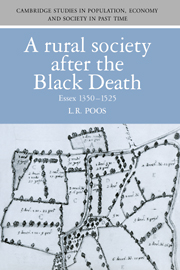Book contents
- Frontmatter
- Contents
- List of figures
- List of tables
- Preface
- Abbreviations
- Part I Reflections on a transitional era
- Part II ‘Country-dwellers, common folk and craftsmen’
- Part III ‘The total sum of all persons’
- Part IV ‘While it is so forward between us’
- Part V ‘She came that day seeking service’
- Part VI ‘Beware of such holy men’
- Part VII Synthesis
- Appendix A The fourteenth-century poll taxes
- Appendix B Time-series of economic data
- Appendix C Essex fulling mills
- Bibliography
- Index
- Cambridge Studies in Population, Economy and Society in Past Time 18
Appendix A - The fourteenth-century poll taxes
Published online by Cambridge University Press: 14 September 2009
- Frontmatter
- Contents
- List of figures
- List of tables
- Preface
- Abbreviations
- Part I Reflections on a transitional era
- Part II ‘Country-dwellers, common folk and craftsmen’
- Part III ‘The total sum of all persons’
- Part IV ‘While it is so forward between us’
- Part V ‘She came that day seeking service’
- Part VI ‘Beware of such holy men’
- Part VII Synthesis
- Appendix A The fourteenth-century poll taxes
- Appendix B Time-series of economic data
- Appendix C Essex fulling mills
- Bibliography
- Index
- Cambridge Studies in Population, Economy and Society in Past Time 18
Summary
The foregoing study of late-medieval Essex has drawn heavily and in a number of different ways upon data from the later-fourteenth-century poll-tax returns. These sources pose large obstacles to anyone attempting to see through them some basic, systematic measures of post-Black Death society, economy and demography. A definitive study of all the issues that these sources pose has yet to be written. Nevertheless, the data are by no means entirely impervious to systematic analysis of broad, aggregate patterns, especially when taken at a county-wide level. But any such analysis must take into account a number of factors concerning the collection of these taxes, and particularly the tendencies of relative underenumeration apparent in their returns.
The three successive Parliamentary grants of poll taxes – in 1377, 1379 and 1380–1 – represented an innovative though short-lived experiment in English fiscal policy, compelled by the need to raise new revenues in the face of renewed threat of war with France. In place of the traditional ‘lay subsidy’, a tax of fixed percentage upon moveable goods, the new tax was to be collected on a per capita basis, greatly widening the net of revenue collection by extending it to persons who would have been too poor to pay the older-style subsidy. The first collection, in 1377, was to be levied at a flat rate of 4d. per head upon all males and females aged 14 and older who were neither clerics nor genuinely impoverished. The two later collections, by contrast, were to be paid on a graduated scale (varying by rank or wealth) by lay people aged 16 (in 1379) or 15 (in 1380–1) years and older, with the poor again exempt.
- Type
- Chapter
- Information
- A Rural Society after the Black DeathEssex 1350–1525, pp. 294 - 299Publisher: Cambridge University PressPrint publication year: 1991



